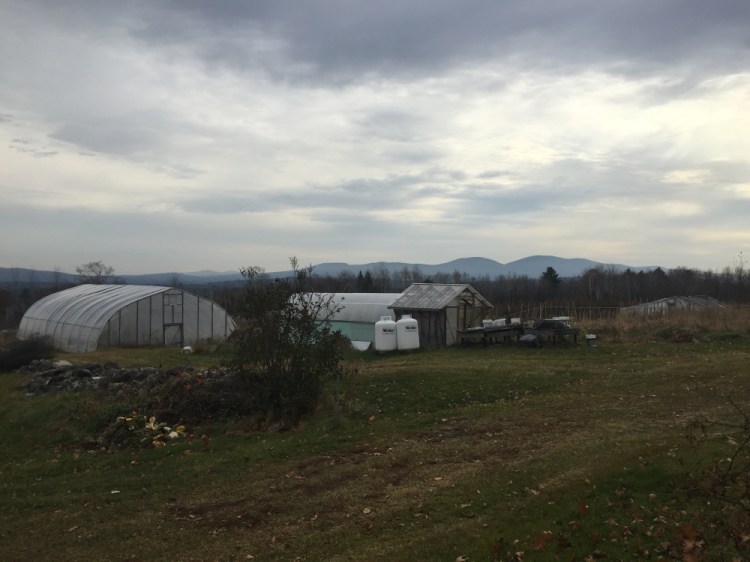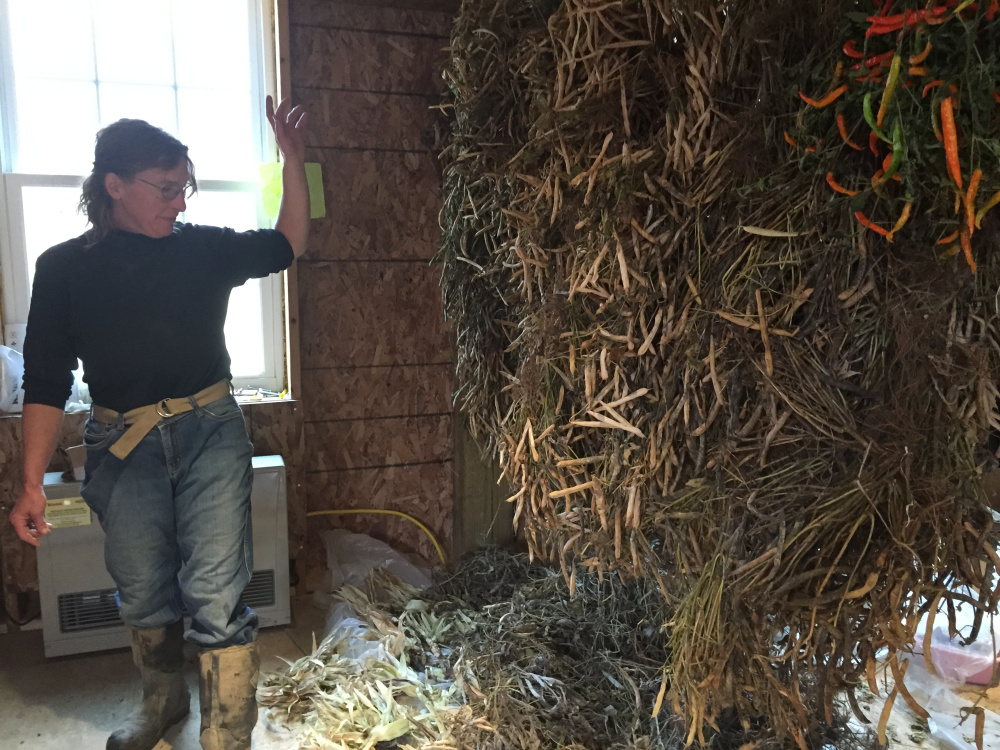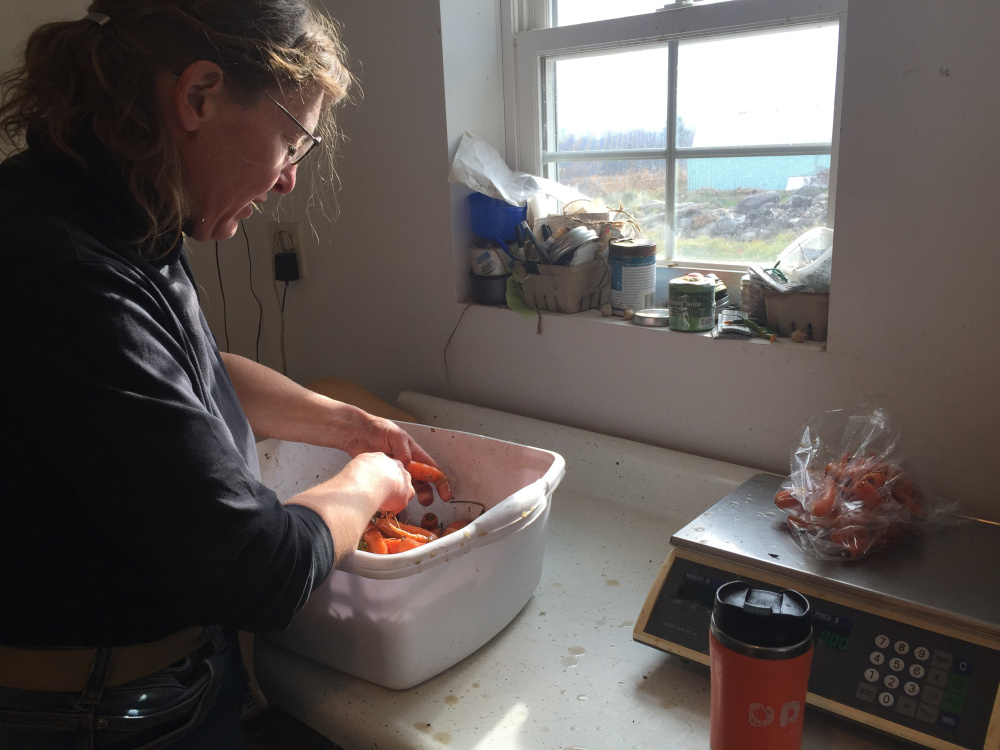Farmington’s Winter Market starts up again Saturday, and area farmers were busy Friday morning getting vegetables out of their fields and storage rooms and making them ready for sale.
“Preparation generally takes longer than the market itself,” Deborah Chadbourne, of Rasmussen Farm in Freeman Township, said as she washed and bagged carrots Friday morning in her storage and preparation barn.
The market has new hours this season. It will run from 10 a.m. to 1 p.m. at the Farmington Grange Hall instead of 9 a.m. to noon as it has in previous years. The market runs from November to April, giving local farmers and producers an outlet to sell their goods year-round after the outdoor summer markets close in October. About 15 vendors are expected to attend the market Saturday, according to market organizer Bonnie Clark, though the number of vendors varies from market to market through the winter season.
“Winter markets in Maine are popping up all over the place. There is a lot of growth in them,” said Samantha Howard, agriculture promotions coordinator for the Department of Agriculture. “Farmers are finding a lot of ways to extend their seasons. (In the winter) they still have a wealth of items for market.”
According to the Maine Federation of Farmer’s Markets, in 2014 there were 35 winter markets open to farmers and customers across the state. The federation’s executive director, Lee Hellett, expects a similar number of markets this winter, but the scale of markets varies depending on how many area farmers can produce goods all year.
At Saturday’s market, farmers and vendors will be offering an array of items, including potatoes, squash, leeks, greens, Brussels sprouts, late fall fruits such as apples, dairy products, bread and grains, as well as homemade items such as jams and pies.
Depending on a farm’s capacity, productive seasons can be extended into the winter by using greenhouses or storing produce harvested in the late summer and fall. To be able to have enough products to sell at winter markets, farmers have to plan their seasons in advance.
Howard said some farmers cannot take advantage of winter markets, either because they do not have the capacity to extend their growing seasons or do not have the room to store produce that has been harvested. But for farmers such as Chadbourne, the ability to participate in a winter market is vital to selling produce she has harvested in the fall and will store through the winter.
“I have a room full of 2,000 feet of potatoes that I’ve harvested (from our field). That works out to be about 400 pounds of potatoes,” Chadbourne said.
Chadbourne has been participating in Farmington’s Winter Market for four years and also manages the Western Maine Market, an online market that operates all year long. These outlets allow Chadbourne to sell potatoes, carrots, onions, squash and countless other items that she has harvested out of the ground and prepared for storage in temperature-controlled rooms.
With winter limiting the growing season — though Chadbourne is able to grow kale in her greenhouse all winter long — she must plan ahead to determine how to make her fall harvest last all winter, for selling and for personal use.
“In the summer, we can take everything we harvest to market,” Chadbourne said. “But for the winter market, we never bring everything.”
Chadbourne’s barn was full of a rainbow of produce Friday morning. She washed and prepared the final harvests of several summer greens and vegetables that will go to their last market Saturday. But tucked into a walk-in cooler and a lofted attic space were vegetables she has cured for winter storage.
Stored in the cooler were carrots with their greens taken off and dirt still intact that were ready to be packed in sawdust to keep through the winter. There were also buckets of potatoes, apples, several varieties of root vegetables, cabbage and leeks.
In buckets sitting on the stairs up to the barn’s attic were varieties of onions and shallots that she would later hang to dry and sell. In the attic, where the temperature is regulated at 50 degrees for storing, Chadbourne also is hanging beans to dry and storing her vast harvest of winter squash.
Chadbourne said that her stored harvest will get her through the majority of the winter, though she said around March her appearances at the market might vary based on what she still has available to sell.
Smaller farmers, such as Erica Emery, of Rustic Roots Farm in Farmington, run out of resources early in the winter market.
“We only do the winter market for about a month. We don’t have a winter growing facility or the storage capacity at our farm,” Emery said.
At Saturday’s market, Emery will be selling the last of her fall harvest of squash, onions, potatoes, carrots and Brussels sprouts. While next year she plans to be able to grow all year with the completion of a greenhouse that is under construction, this year Emery has to be creative to make ends meet throughout the winter.
“The winter season really is our slow season,” Emery said. “I’m sort of just hodge-podging some things together to get through the winter.”
Emery plans to do substitute teaching, but a side business she started with her mother and sister, Sweet Life Kettle Corn, will keep her attending markets throughout the winter, selling their homemade kettle corn.
Lauren Abbate — 861-9252
Twitter: @Lauren_M_Abbate
Copy the Story LinkSend questions/comments to the editors.





Success. Please wait for the page to reload. If the page does not reload within 5 seconds, please refresh the page.
Enter your email and password to access comments.
Hi, to comment on stories you must . This profile is in addition to your subscription and website login.
Already have a commenting profile? .
Invalid username/password.
Please check your email to confirm and complete your registration.
Only subscribers are eligible to post comments. Please subscribe or login first for digital access. Here’s why.
Use the form below to reset your password. When you've submitted your account email, we will send an email with a reset code.